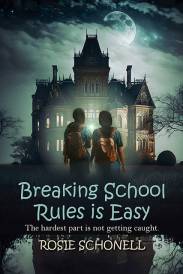Paul Kewley Shaun the Sheep: Farmageddon
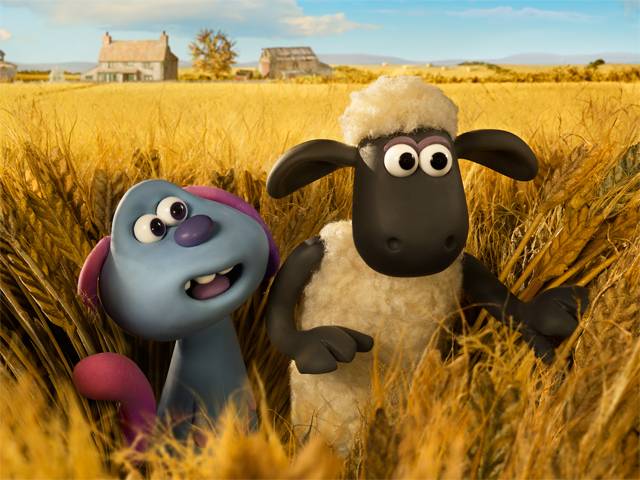
Join Shaun and Lu-La On Their Incredible Adventure
Rated: G
Running Time: 87 minutes
Synopsis: Strange lights over the quiet town of Mossingham herald the arrival of a mystery visitor from far across the galaxy… When the intergalactic visitor, an impish and adorable alien called Lu-La, crash-lands near Mossy Bottom Farm, Shaun soon sees an opportunity for alien-powered fun and adventure and sets off on a mission to shepherd Lu-La home.
Lu-La's magical alien powers, irrepressible mischief and galactic sized burps soon have the flock enchanted. Shaun takes his new extra-terrestrial friend on the road to Mossingham Forest to find her lost spaceship, unaware that a sinister alien-hunting agency is on their trail.
Can Shaun and the flock avert Farmageddon on Mossy Bottom Farm before it's too late? Join Shaun and Lu-La on their incredible adventure in A Shaun The Sheep Movie: Farmageddon.
A Shaun The Sheep Movie: Farmageddon
Release Date: 9th January, 2020
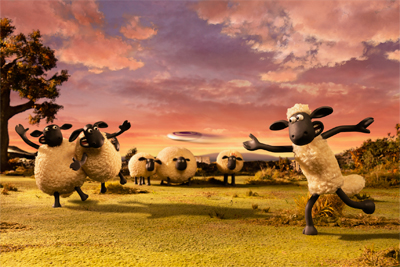 Steering the Space Ship
Steering the Space Ship
Producer Paul Kewley on the perils of stop-motion, and why Shaun the Sheep is to comedy what Chuck Norris was to action...
Falling into the entertainment industry when his brief vocation to be a doctor evaporated aged just 18 ("Without doubt, many patients' lives have been saved as a result," he notes dryly), Farmageddon producer Paul Kewley has been with Aardman for just shy of a decade. As the man tasked with wrangling a vast flock of creative types, it is perhaps no surprise that Kewley's favourite character is that of authoritarian big brother, Bitzer. But while Bitzer is synonymous with taking himself too seriously, Kewley's attitude is a mix of both the serious and the silly: the perfect qualities to steer Shaun on his biggest adventure yet. As he himself says, "The most important thing when you are in a position to make decisions is to make a decision quickly and concisely and if you are wrong at a later stage then make the right decision and learn from the mistake you made…"
Question: Even though you're close to release, everyone here at Aardman seems remarkably calm. Shouldn't you all be rushing around now?
Paul Kewley: We're all just resigned to our fates! [Laughs] No, I think the process is always like your pants are on fire, when you make these films. Mark Burton [writer] actually describes it as a slow-speed car crash, making an Aardman movie, and I rather agree! Rather than having these high-speed moments, where everything happens at once, which happens in live-action, with these movies you can see the problems coming, but it takes longer to steer the ship around them. Trying to find a solution to those things, you might come up with an idea in the room and think you've fixed it, but then you have to go to storyboards and so on to see if that fix works. That takes a minimum of a few days. And the ramifications of those changes aren't always simple.
Question: Is brainstorming your favourite part of the process?
Paul Kewley: I love the process of trying to break the story, which is a poncey way of saying, 'Coming up with the story.' Trying to find the big ideas. But it can be really infuriating as well. You do find yourself at points talking about something for days and then someone says, 'But hang on, what about this…?' And then you see the whole thing crumble before your eyes. It's about building and rebuilding. We're constantly finding the foundations for the story. I love being part of that creative process.
How about the test screening process? They must be fairly nail-biting, sometimes?
Paul Kewley: They are always fairly terrifying experiences, but you learn over the years to walk into them and just go, 'What will be will be.' You can sit there and worry about it, but you won't get anything out of that. It's actually a really fascinating process, to watch how other people react to it. As you make the film, everyone who is involved with it has opinions about what is right or wrong with it. It's very difficult to dismiss those. But, when you see it with an audience, the reality is that it plays how it plays and you can't argue with that. I love it and I dread it all at once.
Question: Whose reaction are you concerned about most, that of the adults or the kids?
Paul Kewley: Both, because we're trying to make a film that works for both groups. It can't be that just kids love it, you know? I'm 48 years old, I don't want to sit through something with my seven-year-old and be bored to tears. I want to enjoy it as much as he does! So, you're trying to cater to both parties and I think that's what Aardman has done so brilliantly for all these years. I think it has worked for both groups kind of seamlessly.
Question: Did becoming a dad change your filmmaking process in any way?
Paul Kewley: I think you fundamentally become aware of what kids are watching. But I was always drawn to family films, even in my twenties, when I went off to the States to study all this at university. I loved Amblin films, these big popcorn family movies. And animation has moved more and more into that space. I'm not an animation 'geek' but I love that animation allows you to tell stories in a different way. And having kids just reminded me of that. I've got a seven-year-old and I've got 21- year-old, so they span generations. I've been able to see over those 20 years the way animation has changed and see how they've reacted to it.
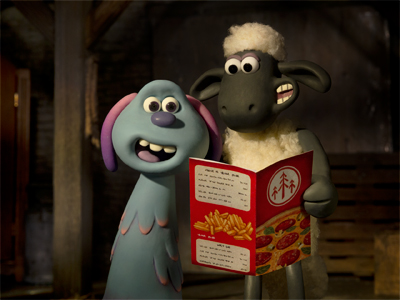 Question: As producer, are you called in to adjudicate between what is possible and what is not?
Question: As producer, are you called in to adjudicate between what is possible and what is not? Paul Kewley: Yes, a lot of what I do is adjudication. It's my job to make sure everyone is sailing in the right ship to the right port, which is so often not the case when you're making a film. It is my job to be the person who keeps all the plates spinning, to make sure that all decisions are made quickly and, hopefully, are the right decisions. One of the things I learned very early on in my career was from a professor I had, who was a really experienced producer. He said, 'There is no right or wrong answer. The most important thing when you are in a position to make decisions is to make a decision quickly and concisely and if you are wrong at a later stage then make the right decision and learn from the mistake you made.' If you let indecision rule, no film ever gets made.
Question: Aardman is famous for how much it cares about character. Do all your characters have a backstory written down somewhere?
Paul Kewley: Yes, all of them. Because it's important that everyone has the same understanding of a character. Because if you've got 20 animators all animating the same character, they have to all have the same idea of who that character is. It's essential. You try to keep the characters as concrete as they can be. The only time you might break that is for comedy, for a moment that is funny. And people know these characters. If you talk to kids, they will be able to tell you who Shaun is, who the farmer is, who Bitzer is, and what they're like. So, if you change that fundamentally, people will be like, 'What have you done?'
Question: Why has Shaun stood the test of time as well as he has?
Paul Kewley: When Nick [Park] created him, he created a perfect character. And what Richard [Starzack] did when he created the TV series [in 2007] is figure out how to take that character and build on it, to make him a character we all understand. Shaun is no angel. But I don't want my seven-year-old to be an angel all the time. I want him to have a bit of the Devil in him sometimes. That's Shaun. He's the guy who will always press the red button, but he'll always know he's done something wrong when he has. That's why we can all relate to him.
Question: Is his and Aardman's unique comedy voice key to how big a star Shaun is, all over the world?
Paul Kewley: Absolutely. The reason that the [Aardman] films travel, in the same way Mr Bean does – is because of their universal, physical comedy. The thing about Shaun is that in Germany, audiences think it was made in Germany. Same in Japan, the Middle East. He's like Chuck Norris. Action travels. So does physical comedy.
Twin Engines
How co-directors Will Becher and Richard Phelan fused their skillsets and worked together to take Shaun interstellar...
For directors Will Becher and Richard Phelan, Farmageddon isn't just a movie, it's a dream. "Not one without its nightmarish moments, to be fair," laughs Phelan, "but they've all been worth it." It's their first feature-length collaboration as directors – and there's a lot of pressure that comes with that, from the first Post-it notes on the wall when they were breaking the story almost three years ago through to manning 35 shooting units on up to 70 custom-built sets and scoring the final product at London's iconic Abbey Road.
The pair have been working separately at Aardman for some time – Phelan in story, Becher in animation – but, having been brought together by producer Paul Kewley, they have fused into something entirely new, a two-headed co-directorial beast charged with a bold new direction for a company that has been a beloved part of British culture for four decades. "That was a huge part of the appeal," says Becher. "The chance to do Aardman's first sci-fi film."
The results have proved extraordinary, Farmageddon at once elevating the world of Shaun the Sheep to epic new genre heights, but never forgetting the sheer pure heart beating beneath its woolly exterior. "Will and Richard have sent Shaun on his biggest adventure ever on this," says coexecutive producer Carla Shelley – who, having herself been at Aardman for over 30 years, knows quite what a leap for sheepkind the studio has taken here.
With both Phelan and Becher having worked on the Shaun The Sheep TV series previously, they knew the character inside out. But what made them ideal partners was the complementary styles they brought to the process. After all, if you're telling a feature-length story that has precisely zero dialogue, who better to convey that story through visuals than one master of story and another of animation? "Frankly, that was exactly the logic," says producer Paul Kewley. "The combination of the two just brought out the best in each other. Will has a very strong understanding of the process, of how the films are made. And Rich has a great understanding of ripping things up and starting again..."
Question: Shaun goes sci-fi in Farmageddon – how did you turn that core idea into an actual story?
Richard Phelan: I think we just kept returning to the character and the relationship between Shaun and Lu-La. This is a movie that's about friends and responsibility and what it's about to meet someone and become best friends. But then we also bring some villains in. We have top secret government organisations, robots, gadgets and gizmos – so this whole world opens up. We're always asking ourselves questions like, 'What if Lu-La is as cheeky as Shaun? What does her planet look like? Why do they get along so well? Is her home a bit like his home?' We're always playing with those ideas.
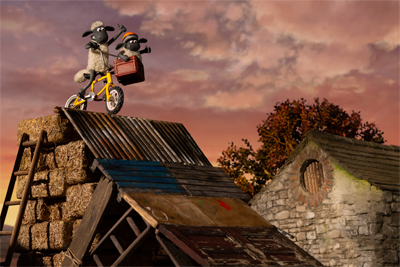 Question: How much of her home are we going to see in the movie?
Question: How much of her home are we going to see in the movie? Richard Phelan: We get to go to her planet, in flashback, which was brilliant fun. I wish we could spend more time there, but the story demands we have to go back to Shaun's world as that's where everything will come to a head.
Will Becher: But we have some fun there, in space. An element of Lu-La's home is her spaceship and we get to spend a lot of time in that. Shaun gets to explore, of course – because he's the boy who always wants to press the red button, if there is one. For him, the spaceship is like the most amazing toy he could imagine.
Question: Why do you think audiences connect with Shaun so much? What is it that makes him so special?
Will Becher: I grew up watching Wallace and Gromit, obviously. And Shaun had a tiny amount of screen time in 'A Close Shave', but he was just the most adorable and funny character. And his story that has come out of that since grew organically but had these really strong foundations, in that the characters are very clearly defined. Really, it's all about family. Shaun's stories are told through the eyes of a boy and his mates. And there's limitless appeal to a sheep doing things in the human world that the humans don't see. He's a challenge to create because in some ways the possibilities are limitless. But there are certain rules without dialogue. We have to tell the character story as well as make it fun and slapstick. But I just love it. A lot of this is based on ideas that relate to our lives. Things that are universal in appeal, hopefully.
Question: How do you translate your experiences into story ideas?
Richard Phelan: That's a tough one because in the series they are always seven-minute episodes. Fundamentally, they are about a cheeky kid with a good heart who always has adventures with his mates. Things go wrong and they put them in a real slapstick way. But, with this, we are trying to add a new element of nuance, of him growing up. So, we needed a new character. And then we decided that she – Lu-La – should be a lot younger than him, so he has to start to grow up to look after her. And that's something he's never had to do before. He's always just been like, 'Let's have a laugh.' But in Farmageddon, Lu-La is in real danger because there are forces out there that will take her away. Shaun has to step up. These are feelings that many people with siblings will identify with.
Question: What did you want to achieve with this movie?
Richard Phelan: In the first movie, Shaun and his mates had a simple goal: they wanted a day off, to get out from under dad's [the farmer] rules. In this, we wanted to look at the relationship between the brothers [Shaun and 'older brother', Bitzer]. How would that play out? Not that Shaun wants to get rid of Bitzer. He just wants to be free and always do what he wants. So, we wanted to give him a new character that would force him to take on the Bitzer role, where he had to feel what that felt like, where he would start to appreciate what he does for him. And through this whole story, Bitzer realises that he takes himself too seriously, that his rules are too much.
Question: Co-directing is very rare in live action, but not unusual in animation. How do you two guys work together?
Will Becher: We had already worked at Aardman together on various projects. Probably for 10 years or so. Then we started to work more closely together on story. And, at the start of this project, Richard was involved in story for a long period of time. Then, when I came on board, we really spent as much time together as possible, riffing on those ideas, trying to find the best version of the story. But from very early on we felt like we felt the same way about Shaun, the flock and that world. So, it was really fun just brainstorming how Lu-La would impact the Shaun world and what she would do. We spent most of the time together doing all the different work together in terms of design, story and edit. Then, when shooting started, we divided up the scenes and had different crews. We would always come back together for those edit sessions where everything comes together. But it's very much day-to-day. Rich has some bits and I have some bits. But overall we've both got the vision of the whole film in our heads.
Question: There are so many moving parts to an Aardman movie, to the point that at some points on this you had 35 units shooting at once. How do you get your head around those kinds of logistics?
Richard Phelan: It is rigorously planned in story. Then we pitch various gags. Then, it goes through a process where it is storyboarded and re-storyboarded multiple, multiple times. Every joke is fine- tuned. And then it goes to the floor and the animators get involved and then the joke is refined even more. It's a constant, fluid process. It's not, 'Hey, I've had a wacky idea!' It's all very meticulously, rigorously thought out.
Will Becher: And Sim Evan-Jones, our editor, has got an incredible experience in animated filmmaking. So, all of our combined efforts are going into this. He is overseeing the edit, which is vital in a film like this. Mark Burton [co-writer] has been really involved as well, and he also wrote and directed Shaun One [Shaun The Sheep Movie]. He has been pivotal in all the story sessions, as has our producer, Paul Kewley of course, who was invaluable in the creative process and steadied the ship at all times.
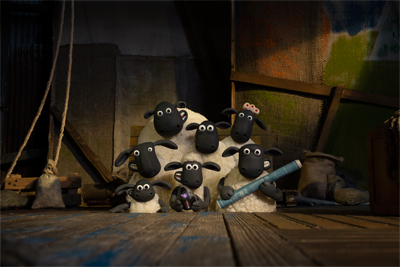 Question: What is your relationship like with Mark, given that he directed the first movie?
Question: What is your relationship like with Mark, given that he directed the first movie? Richard Phelan: That helps, because you're coming from the same place. He will pitch us an idea in story and we will take him to task. And vice versa. There are no egos in that room. There can't be. You are allowed to be wrong because we are looking for the very funniest version, the most entertaining version, of all of it. We are always finessing things. Always.
Will Becher: We won't always have the same solution to a problem, either. Because Mark has been a director himself, he is really respectful of the fact that this is our film, but if he picks up on something, or if we pick up on something, then we will all chip away at the problem. All those notes are what make the film really good. You've got to always be questioning.
Question: Farmageddon feels decidedly epic, even more cinematic than Shaun was before. Is that down to the genre as much as anything?
Richard Phelan: The fact that it's sci-fi certainly plays a part because the genre is so big. We're in the sphere of influences like [Steven] Spielberg movies, '50s B-movies, John Carpenter movies… It just feels expansive, a whole new world to explore.
Question: What sci-fi movies did you look at to get in the mood?
Will Becher: As many as we could, from every era. We have watched every decade of sci-fi. The '80s, obviously. There were so many great sci-fis in the '80s – they gave that flavour to our youth." Phelan: Even if you're not a sci-fi fan you'll get loads of these references, but if you are a sci-fi fan there's a whole substrata to the movie. And then there's the strata under that, for me. Where it's like, 'Yeah, I'll get that one!'
Question: Presumably, having this new genre to play in is a bit of a dream come true for all of you making it?
Richard Phelan: All the art department is so giddy because all of their influences can come to life. Everyone is geared up. It's Spielberg, it's Kubrick. Sci-fi is like a giant toybox.
Will Becher: It is total dream-come-true stuff for me. Because I love Shaun, I've always loved working on Shaun. And to be working on a feature film with him, one that feels like it has a really strong, genuine story at the heart of it, makes it feel like a great development for Shaun, as a character. This is not just a follow-on from the first one.
Richard Phelan: That was the thing. We didn't just want to re-tread the first film's storyline and go, 'Uhoh! It's happening again!' That terrible sequel feeling, you know? We have gone on a totally different tack, it's a totally different adventure. And it feels so different, so unexpected. That's a really lovely feeling at the end of it. You go, 'Phew!' The first one is a really wonderful film and I am very proud to have worked on it [as lead character animator], but we didn't just want to repeat it.
Question: Now the movie is finally about to be revealed to the world, how are you both feeling that you're coming to the end of a three-year process?
Richard Phelan: I'm excited to show everyone. I'm also relieved we made it through. But I am also gutted that it is over because it's been so much fun.
Will Becher: It's been a rollercoaster. Every day there is a new problem to solve. But I feel similar to Rich. It's been a marathon effort, a huge challenge to make a stop-motion film. And I'm really pleased. I'm really proud.
A Shaun The Sheep Movie: Farmageddon
Release Date: 9th January, 2020
MORE


